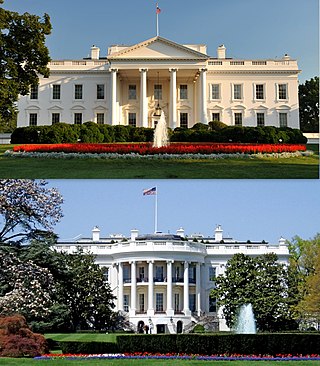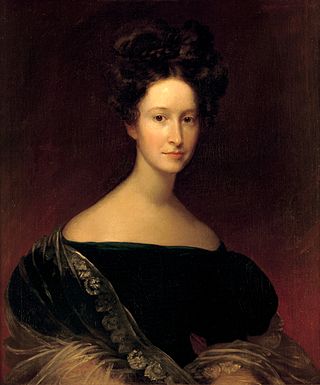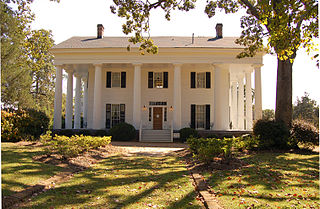
Andrew Jackson was an American lawyer, planter, general, and statesman who served as the seventh president of the United States from 1829 to 1837. Before his presidency, he gained fame as a general in the U.S. Army and served in both houses of the U.S. Congress. Often praised as an advocate for ordinary Americans and for his work in preserving the union of states, Jackson has also been criticized for his racial policies, particularly his treatment of Native Americans.

The White House is the official residence and workplace of the president of the United States. Located at 1600 Pennsylvania Avenue NW in Washington, D.C., it has served as the residence of every U.S. president since John Adams in 1800 when the national capital was moved from Philadelphia. The term "White House" is often used as a figure of speech for the president and his advisers.

Hickory County is located in the U.S. state of Missouri. As of the 2020 census, the population was 8,279. Its county seat is Hermitage. The county was organized February 14, 1845, and named after President Andrew Jackson, whose nickname was "Old Hickory." The Pomme de Terre Dam, a Corps of Engineers facility, is located three miles south of Hermitage and forms Lake Pomme de Terre by damming the Pomme de Terre River and Lindley Creek. Truman Reservoir, also a Corps of Engineers facility, floods the Pomme de Terre Reservoir from the northern border of the county southward to the city limits of Hermitage.

The Indian Removal Act of 1830 was signed into law on May 28, 1830, by United States President Andrew Jackson. The law, as described by Congress, provided "for an exchange of lands with the Indians residing in any of the states or territories, and for their removal west of the river Mississippi". During the presidency of Jackson (1829–1837) and his successor Martin Van Buren (1837–1841) more than 60,000 Native Americans from at least 18 tribes were forced to move west of the Mississippi River where they were allocated new lands. The southern tribes were resettled mostly in Indian Territory (Oklahoma). The northern tribes were resettled initially in Kansas. With a few exceptions, the United States east of the Mississippi and south of the Great Lakes was emptied of its Native American population. The movement westward of indigenous tribes was characterized by a large number of deaths occasioned by the hardships of the journey.

The Hermitage is a historical museum located in Davidson County, Tennessee, United States, 10 miles (16 km) east of downtown Nashville. The 1,000-acre (400 ha)+ site was owned by Andrew Jackson, the seventh president of the United States, from 1804 until his death at the Hermitage in 1845. It also serves as his final resting place. Jackson lived at the property intermittently until he retired from public life in 1837.
Reparations for slavery is the application of the concept of reparations to victims of slavery or their descendants. There are concepts for reparations in legal philosophy and reparations in transitional justice. In the US, reparations for slavery have been both given by legal ruling in court and/or given voluntarily by individuals and institutions.

Andrew Stevenson was an American politician, lawyer and diplomat. He represented Richmond, Virginia in the Virginia House of Delegates and eventually became its speaker before being elected to the United States House of Representatives; its members subsequently elected him their Speaker. Stevenson also served in the Jackson administration for four years as the U.S. ambassador to the United Kingdom before retiring to his slave plantation in Albemarle County. He also served on the board of visitors of the University of Virginia and briefly as its rector before his death.

Sarah Jackson was the White House hostess and acting first lady of the United States from November 26, 1834, to March 4, 1837. She served in this role as the daughter-in-law of U.S. President Andrew Jackson after marrying his adopted son, Andrew Jackson, Jr. She had initially been named as mistress of the Jackson residence in Tennessee, the Hermitage, but she moved to the White House and became co-hostess with Emily Donelson after the Hermitage was damaged in a fire. When Donelson fell ill, Jackson took on the position of White House hostess in its entirety for the remainder of the term. After leaving the White House, she returned to the repaired Hermitage, living there for the remainder of her life.

Emily Tennessee Donelson was the acting first lady of the United States from 1829 to 1834 during the presidency of her uncle Andrew Jackson. She was the daughter of the brother of Jackson’s wife. Jackson’s wife, Rachel Donelson Jackson, died weeks before her husband's presidential inauguration.

Decatur House is a historic house museum at 748 Jackson Place in Washington, D.C., the capital of the United States. It is named after its first owner and occupant, the naval officer Stephen Decatur. The house is located at the northwest corner of Lafayette Square, at the southwest corner of Jackson Place and H Street, about a block from the White House.

African-American candidates for president of the United States from major parties include U.S. Senator Barack Obama (D-IL), elected president of the United States in 2008. He was the first African American to win a presidential election and the first African American to serve as president of the United States. He was re-elected as president in 2012. There had been several candidates in the years before.

Lafayette Square is a seven-acre public park located within President's Park in Washington, D.C., directly north of the White House on H Street, bounded by Jackson Place on the west, Madison Place on the east and Pennsylvania Avenue on the south. It is named for the general, the Marquis de Lafayette, a French aristocrat, and hero of the American Revolutionary War (1775–1783) and includes several statues of revolutionary heroes from Europe, including Lafayette, while at its center is a famous statue of early 19th century U.S. president and general Andrew Jackson on horseback with both of the horse's front hooves raised.

Antebellum architecture is the neoclassical architectural style characteristic of the 19th-century Southern United States, especially the Deep South, from after the birth of the United States with the American Revolution, to the start of the American Civil War. Antebellum architecture is especially characterized by Georgian, Neo-classical, and Greek Revival style homes and mansions. These plantation houses were built in the southern American states during roughly the thirty years before the American Civil War; approximately between the 1830s to 1860s.

Andrew Jackson is a bronze equestrian statue by Clark Mills mounted on a white marble base in the center of Lafayette Square within President's Park in Washington, D.C., just to the north of the White House. Jackson is depicted dressed in military uniform, raising his hat with his right hand, while controlling the reins with his left hand as his horse rises on its rear legs.

The National Baptist Convention, USA, Inc., more commonly known as the National Baptist Convention, is a Baptist Christian denomination headquartered at the Baptist World Center in Nashville, Tennessee and affiliated with the Baptist World Alliance. It is also the largest predominantly and traditionally African American church in the United States and the second largest Baptist denomination in the world.

Dolly Johnson, in later life known as Aunt Dolly, was a small-business owner and domestic worker. She was posthumously described as "one of the finest cooks that ever lived in Greeneville, Tennessee". Andrew Johnson, who became the 17th president of the United States in 1865, enslaved Dolly from 1843 until 1863. The paternity of Dolly Johnson's children, Elizabeth Johnson Forby, Florence Johnson Smith, and William Andrew Johnson, remains an open question in the study of the history of the United States.















